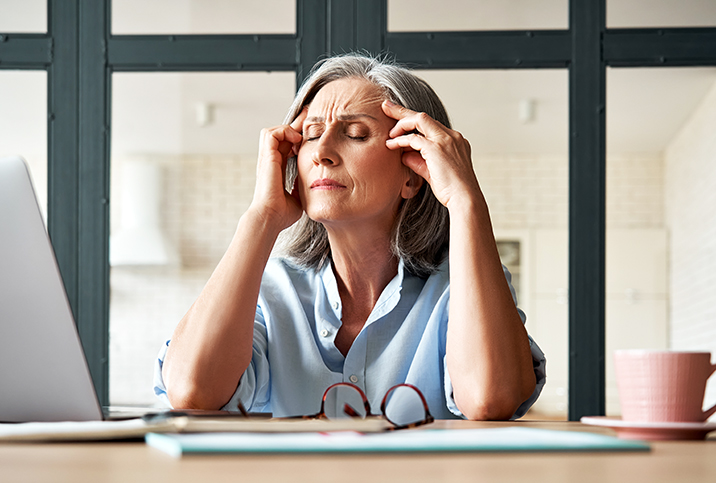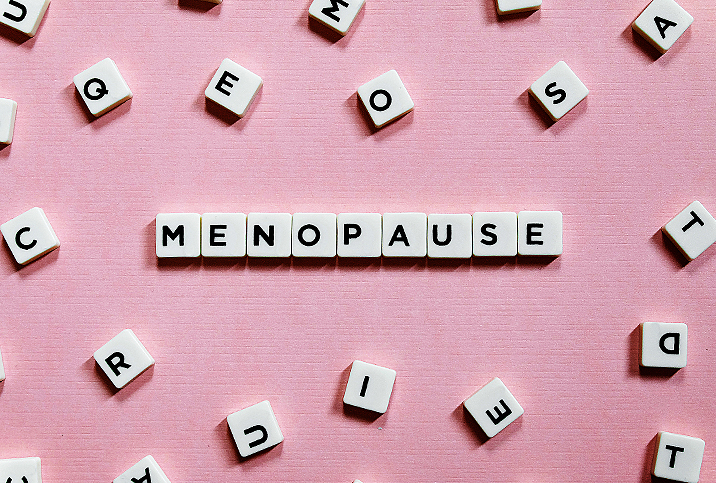In the dating world, age may bring wisdom, but with it comes bias, stigma and a rapidly transforming body.
Menopause marks the end of the menstrual cycle and the beginning of the next phase of life. Although the average age for menopause is approximately 51, it can occur in your 40s, and around 1 in 100 people experience "premature menopause" before the age of 40. For people who have had a hysterectomy, menopause has no age range.
The age of self-love has ushered in an era of open conversations and a fierce drive to eradicate stigma from our society. Sadly, age remains steeped in stereotypes, misconceptions and a societal belief that life gets duller as periods disappear and menopause takes hold.
The truth is "the change" does not have to spell the end of love-induced thrills, regardless of your age or reason for experiencing menopause. People who are dating while menopausal endure complications—however, this doesn't equate to a lack of romantic exploration.
How does menopause affect the body?
Many people associate menopause with causing hot flashes and effectively ending the ability to bear children naturally. But the change is far more complex than just a last call for menstruation.
There are three stages: perimenopause, menopause and postmenopause. During the first stage, hormone production begins to decline, menstrual cycles become erratic, and you may begin to feel other side effects, such as night sweats, brain fog—which impacts cognitive function—and hot flashes. Menopause occurs when someone has stopped producing the hormones that trigger menstruation and is diagnosed after 12 months without a period. Postmenopause occurs after this, and people remain in this stage for the rest of their life.
"The process of menopause starts long before a woman notices the absence of her period," explained Mindy Pelz, D.C., an author and functional health expert based in San Jose, California. "Around 40, the ovaries slowly stop making sex hormones, specifically progesterone and estrogen. This decline in hormones leads to less frequent periods, and often new hormonal symptoms will appear, like hot flashes, insomnia, abdominal weight gain and dramatic mood changes."
Alongside the physical change, menopause triggers mental exhaustion and frustration while it transforms daily life with every new symptom.
Estrogen decline lowers collagen production, causes brain fog, and makes menopausal people more insulin-resistant and prone to musculoskeletal injury.
"The drop in estrogen, progesterone and testosterone all contribute to a decrease in libido," said Tara Scott, M.D., founder of Revitalize Medical Group and medical director of integrative medicine at Summa Health in Ohio. "In addition, vaginal dryness can cause painful intercourse and a decrease in sexual sensation and climax."
Pelz recommends experimenting with estrogen creams and collagen supplementation to help with any sexual discomfort.
Alongside the physical change, menopause triggers mental exhaustion and frustration while it transforms daily life with every new symptom.
"Physically, you've got the weight gain, growing beards, nipple hair, night sweats and all the other things that go on," said Natasha Lacy, a stylist based in the United Kingdom who started experiencing symptoms of menopause at age 49 and is now 50. "But the mental side of it changes some women who are super-confident and have been feeling okay all their life—they suddenly don't anymore. Everything feels overwhelming. You just think, 'Oh, my god, I can't cope with all this stuff.'"
Breaking into dating while menopausal
Though one stereotype of a menopausal person may be a heterosexual, cisgendered married woman, there are countless others traversing the dating world and the menopausal world simultaneously. It can be a treacherous road.
"Menopause is still not widely discussed—it's almost seen as a dirty word," said Kate Mansfield, a dating and relationship coach from the U.K. "The stigma around women's health during menopause can really leave women feeling like they are just too old and that nobody would want to date them."
Over time, the stigma attached to aging—especially for women who are held to impossible standards of beauty throughout their lifetime—has the power to swiftly erode self-confidence.
"We are taught to feel like we're not worthy, that this is something that's wrong with us," Mansfield added. "People are starting to talk about this because this is a natural thing that affects women and can affect women really badly. It affects your relationships, how you work, relationships with your kids, everything."
Regardless of society's obsession with youth and fertility, menopausal people are as desirous as anyone else and deserve to feel the thrill of dating and romance. Menopause does not have to be the restraint that breaks your wings and stops you from soaring.
"Prioritize your health, eat really well, and look after your mind and body," Mansfield advised. "Get help from a coach or therapist to support you while you learn how to date again, and it can actually be a really positive experience."
Communication is the holy grail
Openness during the dating process protects everyone from being hurt later. Menopausal people are not obligated to share this information on the first date, but communicating the effects early on allows them to find the right supportive partner or the best casual sex.
Lacy met her current partner "in the middle of menopause" and was upfront from the beginning.
"I was just really honest about it, and that empowered me to carry on and, of course, I couldn't be with someone who didn't understand," she said. "There was no point in pretending that this wasn't affecting me."
For anyone dating menopausal people, avoiding the conversation only dampens a budding relationship, especially in the bedroom.
'There was no point in pretending that this wasn't affecting me.'
"The menopausal woman is emotionally fragile, and when it comes to sex, the more cared [for] and safe she feels with you, the more open she will be about talking with you about what she is experiencing with the dramatic decline of hormones," Pelz explained. "Good communication filled with lots of patience will not only bring her libido levels up, but together you can find creative, fun new ways to improve lubrication and make sex enjoyable for both of you."
While trying to date and ride a roller coaster of hormones is tricky territory, the best solution is to trust your gut, let it guide you to the right partner, and avoid rushing in before you—and your body—are ready.
Shattering the stigma
Dating for all menopausal people becomes easier once everyone can utter the word without awkwardness or shame.
People going through the change gain wisdom every day. When we accumulate life experiences, we evolve into stronger, mindful people. This insight removes the awkwardness that comes with dating while young and innocent, giving way to another exciting phase of life.
Lacy said: "We can gain knowledge from it. We can become wiser through all we learn about how we really feel about ourselves."















